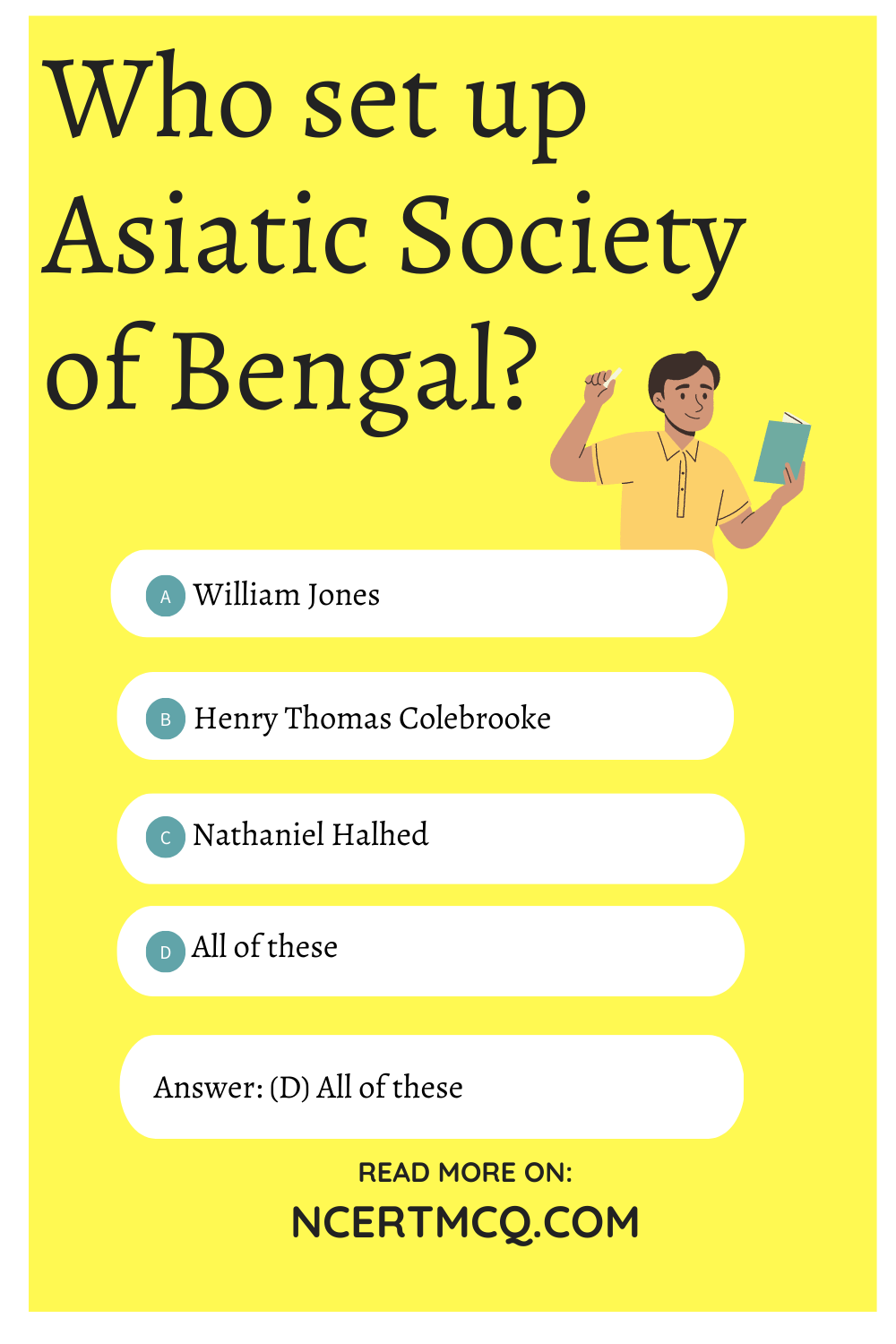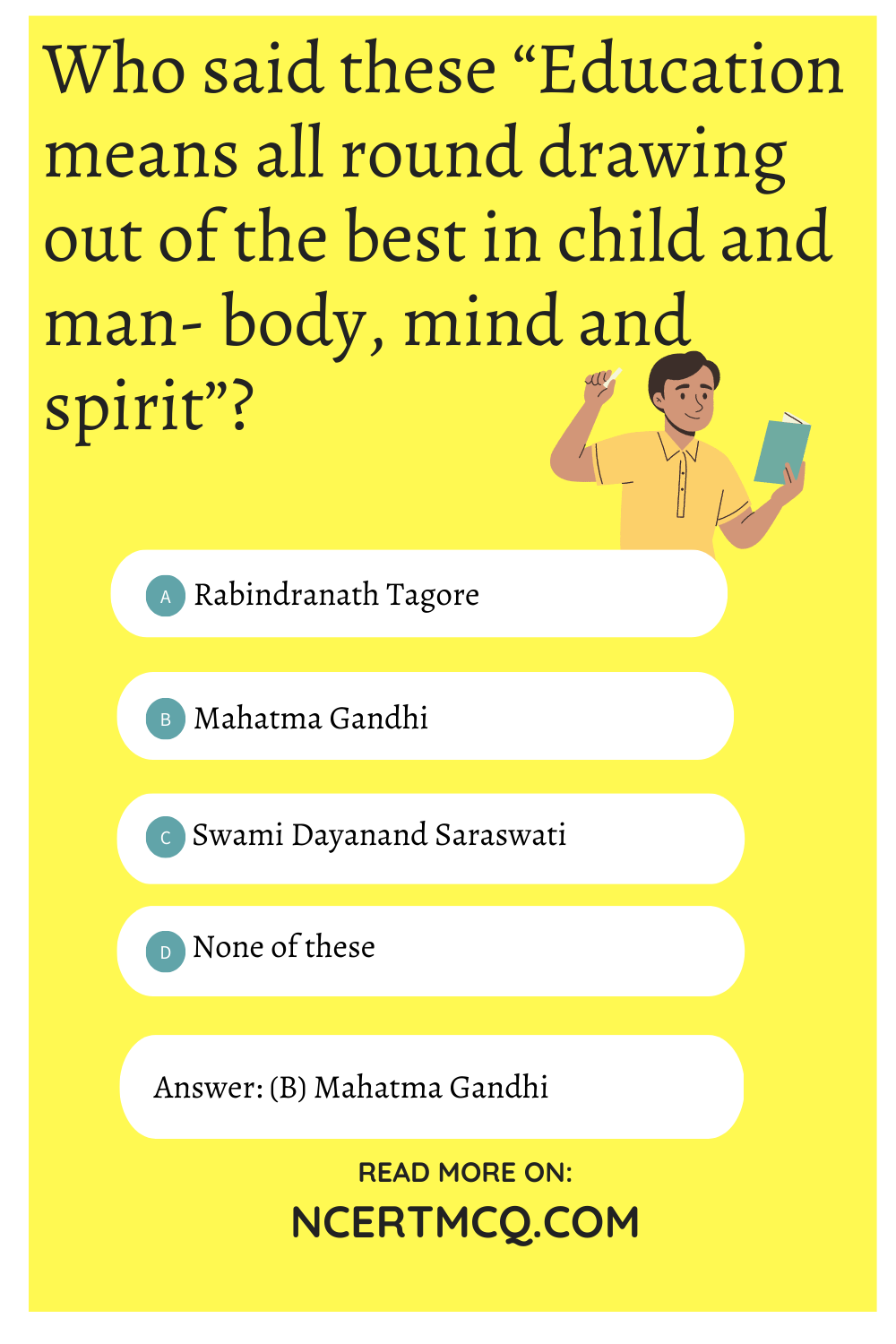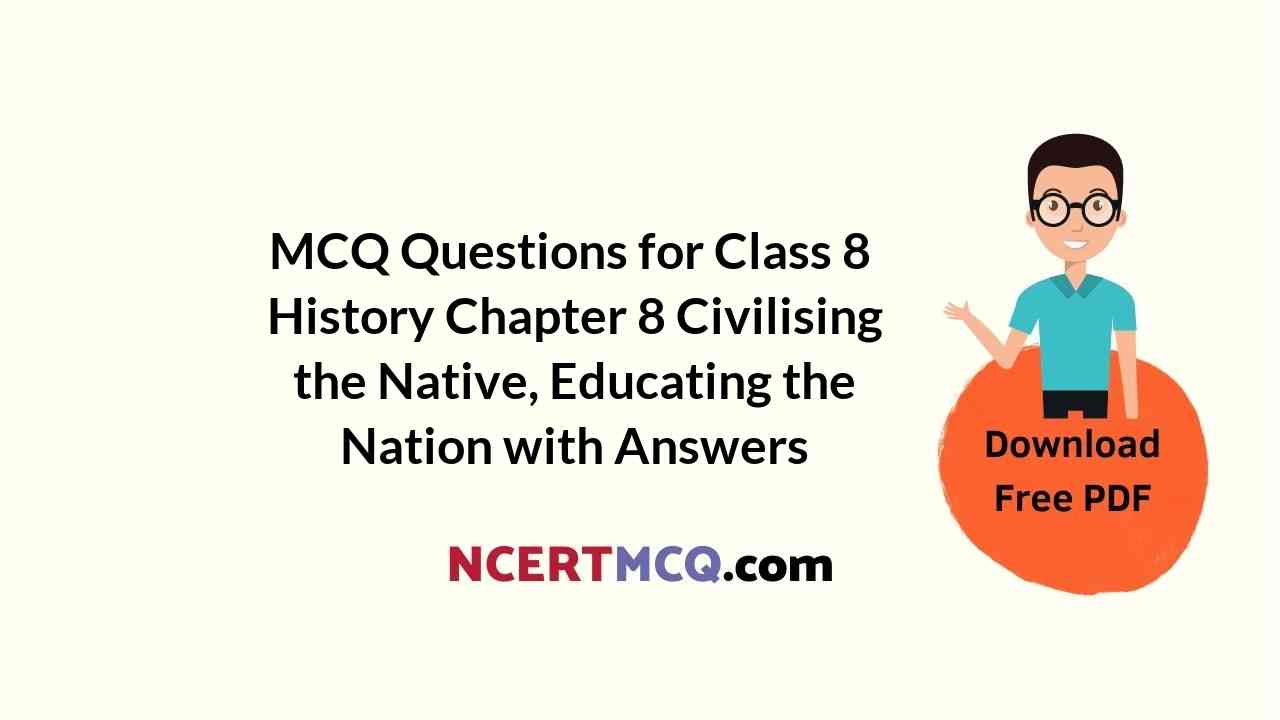Check the below Online Education NCERT MCQ Questions for Class 8 History Chapter 8 Civilising the Native, Educating the Nation with Answers Pdf free download. MCQ Questions for Class 8 Social Science with Answers were prepared based on the latest exam pattern. We have Provided Civilising the Native, Educating the Nation Class 8 History MCQs Questions with Answers to help students understand the concept very well. https://ncertmcq.com/mcq-questions-for-class-8-social-science-with-answers/
You can refer to NCERT Solutions for Class 8 History Chapter 8 Civilising the Native, Educating the Nation to revise the concepts in the syllabus effectively and improve your chances of securing high marks in your board exams.
Class 8 Social Science History Chapter 8 MCQ With Answers
History Class 8 Chapter 8 MCQs On Civilising the Native, Educating the Nation
Choose the correct answer:
Civilising The Native Educating The Nation MCQ Question 1.
William Jones was a linguist because
(a) he had studied Greek and Latin
(b) he knew French and English
(c) he had learnt Persian
(d) all of these
Answer
Answer: (d) all of these
Class 8 History Chapter 8 MCQ Question 2.
Who set up Asiatic Society of Bengal?
(a) William Jones
(b) Henry Thomas Colebrooke
(c) Nathaniel Halhed
(d) All of these
Answer
Answer: (d) All of these

Civilising The Native Educating The Nation Class 8 MCQ Question 3.
Madrasa was set up ip, Calcutta in the year
(a) 1750
(b) 1761
(c) 1771
(d) 1781
Answer
Answer: (d) 1781
MCQ For Class 8 History Chapter 8 With Answers Question 4.
According to whom, “English education had enslaved Indians”?
(a) Rabindranath Tagore
(b) Mahatma Gandhi
(c) Subhas Chandra Bose
(d) Aacharya Vinoba Bhave
Answer
Answer: (b) Mahatma Gandhi
Class 8 History Chapter 8 Extra Questions And Answers MCQ Question 5.
The Education Act was introduced in the year
(a) 1850
(b) 1835
(c) 1910
(d) 1900
Answer
Answer: (b) 1835
Ncert Class 8 History Chapter 8 MCQ Question 6.
Asiatick Researches (Journal) was NOT started by
(a) William jones
(b) Henry Thomas Colebrooke
(c) Nathaniel Halhed
(d) William Carey
Answer
Answer: (d) William Carey
Class 8 History Chapter Civilising The Native Educating The Nation MCQ Question 7.
Study of which of the following was NOT the purpose of setting up Madrasa in Calcutta in 1781?
(a) Arabic
(b) Sanskrit
(c) Persian
(d) Islamic laws
Answer
Answer: (b) Sanskrit
Class 8 History Ch 8 MCQ Question 8.
Who was Charles Wood?
(а) The President of the Board of Control of the Company
(b) e Commissioner of the Board of Control of the Company
(c) An Educationist
(d) Nonp of the above
Answer
Answer: (а) The President of the Board of Control of the Company
MCQ Questions For Class 8 History Chapter 8 Question 9.
The English Education Act was passed
(a) to materialise Macaulay’s thinking
(b) to make the English the medium of instruction for higher education
(c) to stop the promotion of oriental institutions
(d) all of the above
Answer
Answer: (d) all of the above
Civilizing The Native Educating The Nation MCQ Question 10.
What type of school did Tagore want to set up?
(a) Where the child was happy
(b) Where he/she could be free and creative
(c) He/she was able to explore her own thoughts and desire
(d) All of the above
Answer
Answer: (d) All of the above
MCQ On Civilising The Native Educating The Nation Question 11.
Who said these “Education means all round drawing out of the best in child and man- body, mind and spirit”?
(a) Rabindranath Tagore
(b) Mahatma Gandhi
(c) Swami Dayanand Saraswati
(d) None of these
Answer
Answer: (b) Mahatma Gandhi

Match the following:
| Column A | Column B |
| (i) Linguist | (a) A person who can read, write and teach persian. |
| (ii) Orientalists | (b) A local language. |
| (iii) Munshi | (c) A place of learning. |
| (iv) Vernacular | (d) An order brought from England to India by Wood. |
| (v) Wood’s Despatch | (e) A person who knows and studies several languages. |
| (vi) Pathshalas | (f) People who have scholarly knowledge of the language and culture of Asia. |
Answer
Answer:
| Column A | Column B |
| (i) Linguist | (e) A person who knows and studies several languages. |
| (ii) Orientalists | (f) People who have scholarly knowledge of the language and culture of Asia. |
| (iii) Munshi | (a) A person who can read, write and teach persian. |
| (iv) Vernacular | (b) A local language. |
| (v) Wood’s Despatch | (d) An order brought from England to India by Wood. |
| (vi) Pathshalas | (c) A place of learning. |
State whether true or false:
1. Mahatma Gandhi was the promotor of English language.
Answer
Answer: False
2. William Jones had a respect for ancient cultures.
Answer
Answer: True
3. Thomas Macaulay thought that European education was necessary in India.
Answer
Answer: True
4. William Carey had an appointment as a Supreme Court Judge.
Answer
Answer: False
5. Hindu College was set up at Banaras to encourage the study of ancient Hindi texts,
Answer
Answer: False
6. William Adam was a Scottish missionary.
Answer
Answer: True
Fill in the blanks:
1. Mahatma Gandhi favoured ………………….. languages as a medium of instruction.
Answer
Answer: Indian
2. Williani Jones had ………………….. for Indian ancient cultures.
Answer
Answer: respect
3. Charles Wood emphasised the practical benefits of a system of ………………….. learnings.
Answer
Answer: European
4. ………………….. started the Santiniketan in 1901.
Answer
Answer: Rabindra Nath Tagore
5. According to Adam’s report there were over 1 lakh ………………….. in Bengal and Bihar.
Answer
Answer: Pathshalas
We hope the given NCERT MCQ Questions for Class 8 History Chapter 8 Civilising the Native, Educating the Nation with Answers Pdf free download will help you. If you have any queries regarding Civilising the Native, Educating the Nation CBSE Class 8 History MCQs Multiple Choice Questions with Answers, drop a comment below and we will get back to you soon.
Class 8 Social Science History MCQ:
- How, When and Where Class 8 MCQ
- From Trade to Territory Class 8 MCQ
- Ruling the Countryside Class 8 MCQ
- Tribals, Dikus and the Vision of a Golden Age Class 8 MCQ
- When People Rebel 1857 and After Class 8 MCQ
- Colonialism and the City Class 8 MCQ
- Weavers, Iron Smelters and Factory Owners Class 8 MCQ
- Civilising the Native, Educating the Nation Class 8 MCQ
- Women, Caste and Reform Class 8 MCQ
- The Changing World of Visual Arts Class 8 MCQ
- The Making of the National Movement 1870s-1947 Class 8 MCQ
- India After Independence Class 8 MCQ
